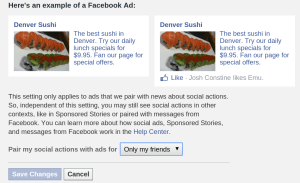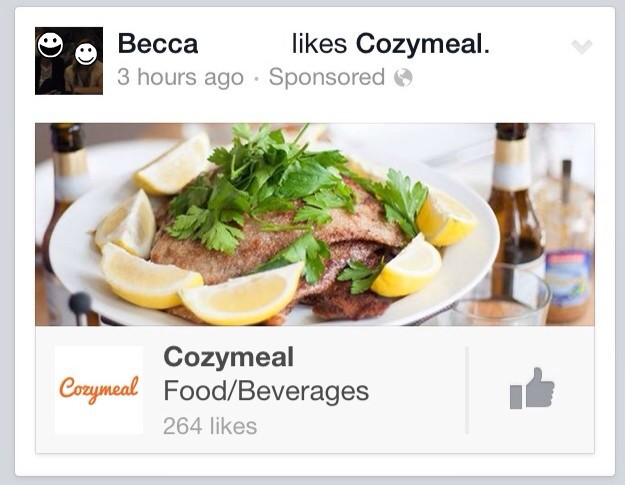Word of mouth, sponsored. Trusted recommendations, promoted. Reviews from friends, endorsed. This is the new lexicon of advertising. As the world learns to ignore traditional advertising online, tech giants have found a way to grab people’s attention: using your name, face, and words. Are we okay with that? Maybe we should be.
Today, Google announced “Shared Endorsements”, an expansion of its program of using your Google+ ‘+1s’ in ads. Now Google can show your activity such as following a brand, commenting on a post, or reviewing a business in ads that feature your name and face to people you allow to see the actions you took. Google lets businesses pay it to share those endorsements with more of your friends than would have seem them normally in search results, maps, Google+, and elsewhere. And Google’s not alone.

Facebook pioneered this social advertising model in 2011 with its “Sponsored Stories” ad units. Facebook’s filtered News Feed only shows you the most important posts about your friends. But if you Like a brand’s Page or post, check in at a business, download or use an app, or share a link, advertisers can pay to boost that action’s visibility in the feed or have it appear in sidebar ads.
Twitter has social ads too. Its “Promoted Tweets” show posts from businesses you don’t follow. To show these businesses are reputable and relevant the ads show the names of people you follow who follow that business. A Promoted Tweet from HP in my stream mentions three accounts I follow that follow it. Twitter doesn’t use your face, words, or content in its ads, though, and the social context is much less prominent than on Google and Facebook.
Combing social signals with advertising makes marketing seem less generic, which is important considering how many ads we see on a daily basis. And just because you don’t click on those ads, doesn’t mean they’re not effective.
As Facebook’s head of measurement Sean Bruich told Farhad Manjoo at Slate, “On average, if you look at people who saw an ad on Facebook and later bought a product, [fewer than] 1 percent had clicked on the ad.” If your friends’ names and faces got you to look, the ads have done their job.
You’re Not The Customer
There’s a saying in the Internet business. “If you’re not the customer, you’re the product.” Essentially, if you’re not paying to use a service, you can expect that your data will be used to make money in some way. For a long time, this business model focused on using your data to target ads. Search for a certain keyword, and you’d see ads for related products. List that you’re a 25-year old male who Likes video games, and you’d see ads for things people in your demographic often buy.

That’s still how a lot of Internet advertising works. Pinterest and Instagram are starting to display ads that will take into account what you follow. LinkedIn analyzes your profile to deliver ads relevant to people in your income bracket, and Spotify looks at what you listen to so country fans hear ads for pickup trucks.
Retargeting is another recent trend in ads. Rather than just targeting ads based on what you do on a service, sites can track the cookies left by other sites you’ve visited around the web. That means if you almost bought a flight to Hawaii on some travel site, Hawaiian Air might pay Google, Facebook, Twitter, or LinkedIn to show you an ad for a discount on that same flight in hopes that you’ll pull the trigger.
But now, it’s not just your data being invisibly used to target ads. Your content and identity are being used as ads.
 Google is doing it in the most respectful and responsible way. You can completely opt out of having your content used as ads. Facebook lets you opt out of being used in “social ads” that display your name next to ads, but you can’t opt out of Sponsored Stories that use your content as ads. Twitter doesn’t offer any way to opt out of your name being used in ads (though you can opt out of being shown personalized follow recommendations and retargeted ads).
Google is doing it in the most respectful and responsible way. You can completely opt out of having your content used as ads. Facebook lets you opt out of being used in “social ads” that display your name next to ads, but you can’t opt out of Sponsored Stories that use your content as ads. Twitter doesn’t offer any way to opt out of your name being used in ads (though you can opt out of being shown personalized follow recommendations and retargeted ads).
Companies have to choose between the health of their business and the freedom of their users. If they let people opt out easily, their ads will be less effective, and they’ll make less money to spend on building their products.
Ads Are Inevitable…
For some people, the gut reaction to the practice of social advertising is a combination of disgust, paranoia, and anger. Being used to shill products make people feel…used. They demand privacy and control. Meanwhile, some champion ad blocking software, and wish they’d never see an ad online again.
But let me offer an alternative perspective. Advertising is the lifeblood of the consumer Internet. Ads are what pay for the designers, engineers, and servers that keep our favorite services running.
Without ads, services like Google, Facebook, and Twitter might have to charge. That would be annoying to some and prohibitively expensive to others. Social networks would be a lot less fun if a third of your friends weren’t there because they didn’t want to pay. And services that deliver knowledge and productivity would be reserved for those with money to spend, rather than for the people who really need information and empowerment. Some good can come from ads.
…Shouldn’t They Be Relevant?
If we accept that big tech companies aren’t going to ditch advertising, we can focus on making our experience with them as painless as possible. That could mean making them easy to ignore. Our instincts naturally draw our eyes to human faces, especially those of people we know. And names of friends stick out from text. If your goal is to maintain a zen-like state while browsing the world’s top sites and apps, social ads aren’t helping.
But if instead you want everything you see online to be relevant and useful, social ads could point you towards things you’ll actually like. There are a lot of apps out there. Seeing an ad on Facebook pointing out which apps your friends use, or on Google noting an app your friend gave a five-star review could aid your quest for something great to download. The same goes for picking local restaurants, movies, or household cleaning products.
 Advertisers will say just about anything to get you to buy (they’ll even use pictures of babies). It’s hard to know if you can believe them when they say they’re “the best calendar app”, “the tastiest pizza”, “the funniest movie”, or “the softest toilet paper”. But you trust your friends. We’ve always asked them for advice directly. Social ads just scale that word of mouth and give you their recommendations without them having to repeat themselves.
Advertisers will say just about anything to get you to buy (they’ll even use pictures of babies). It’s hard to know if you can believe them when they say they’re “the best calendar app”, “the tastiest pizza”, “the funniest movie”, or “the softest toilet paper”. But you trust your friends. We’ve always asked them for advice directly. Social ads just scale that word of mouth and give you their recommendations without them having to repeat themselves.
So in some ways, by not opting out of being used as social ads, you’re being generous. You’re saving your friends from irrelevant ads for things they don’t care about.
Maybe everyone should follow Google’s lead and give you the freedom to opt out of having your name, face, and activity turned into ads — even if it hurts the companies providing free services and your friends who use them. If you want to utilize the opt outs offered, go right ahead. [Update: It’s your right to say you won’t have your identity leveraged and that these companies can find another way to make money. Maybe they should.]
But before you opt out, remember, you can choose to make ads better for everyone else.































Comment